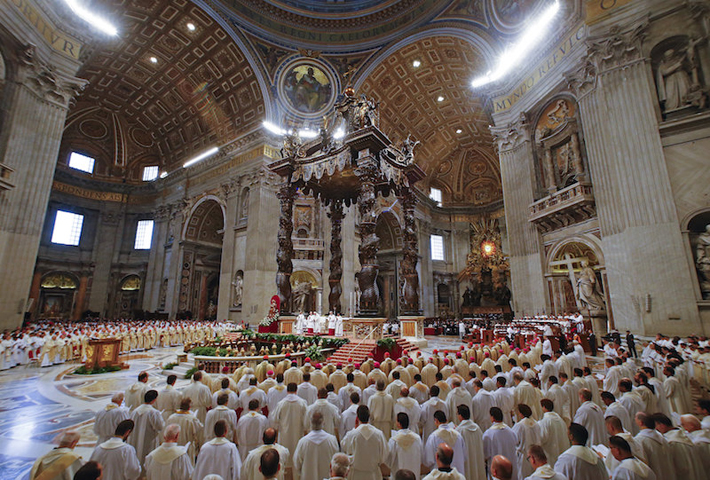
Pope Francis leads the Chrism Mass in St. Peter’s Basilica on March 24, 2016. (Reuters/Stefano Rellandini)
As the death toll from the Brussels terror attacks rose on March 24, Pope Francis began three days of solemn observances leading to Easter Sunday by denouncing those who fuel terrorism the way some once backed Judas against Jesus.
Washing the feet of a dozen migrants at an asylum center north of Rome -- several of them Muslims -- Francis said his gesture was meant to show that we are "all brothers and children of the same God: we want to live together in peace."
He then pointed to the terror attacks in the Belgian capital on Tuesday "by people who do not want to live in peace."
"But behind that gesture," he added, "just as behind Judas, there were others. Behind Judas" -- the apostle who betrayed Jesus after the Last Supper that the pope was reenacting -- "there were those who gave the money so that Jesus would be handed over."
"Behind 'that' gesture, there are manufacturers, arms dealers who want blood, not peace; they want war, not brotherhood. Two gestures, the same: Jesus washes the feet; Judas sold Jesus for money."
"Gestures speak louder than pictures and words," Francis said before washing and kissing the feet of the migrants, some of whom were moved to tears.
"Each of us has a story within us," the pontiff continued.
"So many crosses, so many sorrows, but we also have a heart open to brotherhood. May each one of us in our own religious language, beg the Lord that this brotherhood be contagious in the world, so that there are not 30 coins to kill our brother, so that there will always be brotherhood and goodness."
The highly symbolic Holy Week ritual commemorates the rite that Jesus practiced with his twelve Apostles before his Crucifixion and the inclusion of women -- as well as non-Catholics -- has prompted much debate.
The 12 immigrants at the Reception Center for Asylum Seekers (CARA) in Castelnuovo di Porto included three Muslims -- from Syria, Pakistan and Mali -- and one Hindu from India. Three were Coptic Christian women from Eritrea and the Catholics were from Nigeria.
Earlier this week Vatican official Archbishop Rino Fisichella, who is leading Francis' Year of Mercy programs, said the pope's choice of refugees was significant particularly due to the migration crisis engulfing Europe.
"We can understand the symbolic value intended by Francis," Fisichella wrote in the Vatican newspaper L'Osservatore Romano.
"His actions mean to tell us that it is important to pay due attention to the weakest in this historic moment; that we are all called to restore their dignity without resorting to subterfuge.
"By washing the feet of refugees, Francis implores respect for each one of them," Fisichella said.
Traditionally, the foot-washing by the pope -- or any bishop or priest -- had been performed on men.
But soon after his election in 2013, the pope shocked conservatives by using the occasion to wash the feet of women, Muslims and Orthodox Christians at a prison in Rome.
In January, Francis formally changed the regulations to explicitly allow women and girls to participate.
Earlier in the day, in a morning Mass at St. Peter's Basilica to start Holy Thursday observances, the pontiff told priests that Jesus had fought not for his own glory but to break down walls "to open the flood gates of mercy … he wants to pour out upon our world."
"The mercy of our God is infinite and indescribable," Francis said. "We express the power of this mystery as an 'ever greater' mercy … advancing in that wasteland where indifference and violence have predominated."
Francis sought to highlight the need for mercy, which is also the theme of the 2016 Jubilee Year that he launched in December.
"Mercy restores everything; it restores dignity to each person," the pope said.
Speaking directly to thousands of priests at the Mass, Francis urged them to stay close to the poor and marginalized.
"As priests we identify with people who are excluded, people the Lord saves," he said. "We remind ourselves that there are countless masses of people who are poor, uneducated, prisoners, who find themselves in such situations because others oppress them."
Francis warned that priests themselves "are often blind" to those who are suffering, sometimes "because of an excess of complicated theology" or "because of an excessive 'bubbly' spirituality, a 'light' spirituality."
"We feel ourselves also trapped, not so much by insurmountable stone walls or steel enclosures that affect many peoples, but rather by a digital, virtual worldliness that is opened and closed by a simple click," he said.
"We are oppressed, not by threats and pressures, like so many poor people, but by the allure of a thousand commercial advertisements which we cannot shrug off … "
During the service, known as the Chrism Mass, the pope blessed sacred oils that will be used during the Easter vigil and other liturgical celebrations throughout the year.
Security has been stepped up across Italy and extra police will be on duty at the Vatican and at other popular tourist sites at the weekend as Europe continues to reel from the deadly bomb attacks in Belgium.
The death toll from the Brussels attacks by suspected Islamic extremists rose to 32 on Thursday, while 300 were injured, 60 seriously, according to media reports.



